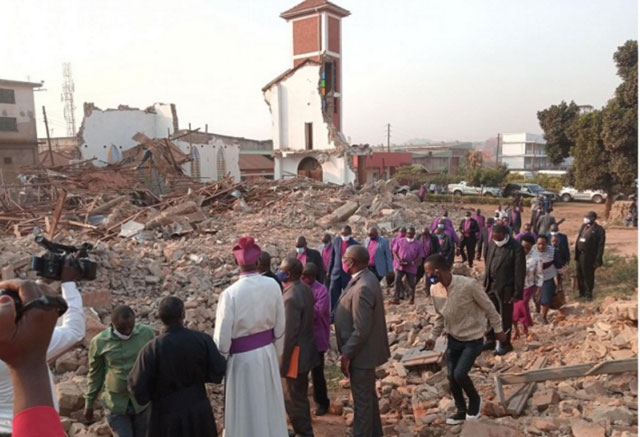

Uganda: On Feb. 28, President Yoweri Museveni wrote a letter addressing it to Robinah Nabbanja, the Prime Minister. The letter directed her to halt land evictions across Uganda. Museveni said he was using his powers under Article 98(1) and 99(1) of the Constitution that enjoins him to ensure good governance and protect the Constitution, President Museveni directed as follows:
“No eviction should be allowed to take place in a district without the consent and direct observation of the District Security Committee (DSC), chaired by the Resident District Commissioners/Resident City Commissioners (RDCs/RCCs) and direct consultation with the Minister of Lands.”
Museveni said if this is not done and the illegal evictions go ahead, the members of the District Security Committee will all be held responsible and action will be taken against them. This, however, excludes the UPDF representatives who may not be in the know of the substance of the issues involved.
In the same letter, the president requested the Chief Justice to prevail upon the Justices and Magistrates who violate the Constitution by illegally evicting people in collusion with land grabbers. He further directed the Minister of Lands to inform the Attorney General about such abuses by judicial officers so that legal action can be taken against them.
But just days after Museveni’s directive, thousands of people were evicted from the land they had occupied for decades in Kyankwanzi District. The people of Kyerere North, Kyerere East, Kiyuni Central, Kiryajobyo West, and Kibanda villages in Gayaza sub-county in Kyankwanzi accuse the widow of General Aronda Nyakairima, Linda Aronda, of being behind the eviction.
Their property including crops and houses were destroyed by bulldozers under the guard of over 30 UPDF soldiers. The residents accuse Linda Aronda of illegally obtaining a title for about 5 sq km of land. The residents say they have lived on the disputed land for at least 80 years, and are baffled at how the late Aronda’s family got to own it.
According to Joel Sebikari, the area Member of Parliament, over 1000 people whose crops were destroyed during the eviction are on the verge of starvation. School children have also had their education interrupted. MP Sebikari called for the punishment of soldiers who were involved in the brutal evictions.
On March 6, a section of the bush war veteran families and victims of land evictions in Nakaseke District in central Uganda tasked the government to take action against land grabbers, landlords and dealers that are targeting bibanja holders for eviction. While meeting State Minister for Lands, Sam Mayanja, the residents of Nakaseke told the minister that land evictions had become a security threat.
“We fought to have peace in our area but several of the families that joined the bush war to liberate Uganda have had their respective land and property taken away,” Steven Mugambwa, a resident of Kimegere told the minister.
“When my family was attacked by a fellow war veteran claiming land that has been occupied since 1974, I was left helpless after my house got demolished.”
Much as Minister Mayanja ordered for the arrest of the eviction ringleaders, the residents remained unimpressed since most evictions are happening at night with supervision of security agents.
During the first COVID-19 prevention lockdown in Uganda, thousands of people faced evictions occasioned by large scale investments by multinational companies in Kiryadongo District. In Okore Sub County in Katakwi District, thousands of residents were left landless when their land amounting to close to 5,000 hectares was grabbed.
Research by Transparency International Uganda on land and corruption during the Covid-19 pandemic lockdown shows that unlawful land evictions were also attributed to the rampant incidences where landlords were selling land without notifying tenants.
“The community cited Kyayi parish, Manyogaseka sub-county in Kassanda District (central western Uganda) where there have been several evictions. This is also evidenced in the case of one Nantezi Agnes- in Kitebele/Butayunja sub-county whose land rights are being violated by the land lord with protection of the security agencies.”
The study states that as result of land evictions, there was destruction of community livelihoods including crops, livestock and other economic property, and shelter. “The affected communities have become food insecure, landless and homeless due to these actions. Protection of the perpetrators of the land rights injustices was provided by the security agencies – state police, army, and private security companies.”

Increased land evictions
Land evictions have become rampant across the country. Some studies show that land evictions in Uganda are being fueled by an increased demand for land amidst a growing population and desire for industrial development. In addition, the demand for private land has increased since Uganda has embarked on implementing an industrial policy, which requires a lot of land. This high demand for land has resulted in more evictions, both lawful and unlawful.
For instance in 2008, the government through the Ministry of Lands gave away the Nakawa-Naguru Housing Estate land to Opec Prime Properties to develop a satellite city but since then nothing has been developed on the land and the tenants who were evicted from this land have never been compensated.
Land grabbing from the locals to avail it for projects dubbed as development is reported as one of the causes of evictions in Uganda.
What the law says
The 1995 Constitution states that the citizens of Uganda can own land under four tenure systems namely: Mailo, Freehold, Leasehold and Customary. On registered land, there may be other people occupying and utilizing the land other than the Landlord. These people are known as tenants. They too, are protected by the law from being illegally evicted.
In effect, the law protects residents against illegal evictions. The police or the military do not have the mandate to conduct evictions. It starts with acquiring certificates, a certificate of occupancy, a title or certificate of customary ownership.
However, oftentimes, the police and army have been used to intimidate and evict tenants. A recent example is the case of Lusanja in Wakiso District where 350 homes were demolished using a falsified court order.
Although the damage caused by forceful and often unlawful evictions cannot be undone, the aggrieved party always has a right of access to the court to dispute the evictions and/or seek compensation. In addition, the government is often obligated by law to support in resettlement and rehabilitation of those who have been forcefully and/unlawfully evicted.
An illegal land eviction is any forcible removal of a tenant, directly or indirectly, without prior court approval. Illegal evictions involve the threat or use of violence; a landlord’s attempt to make a land unlivable in the hope that the tenants will leave.
Lawyers outraged by directive
Interestingly, it is the people closer to Museveni and State House who are in some cases the ones evicting poor people. To save face, President Museveni recently said land evictions should only happen when they have been reviewed by the district security committee.
However, the Uganda Law Society is worried about Museveni’s directive. They say the directive undermines the independence of courts of law.
The Uganda Law Society has particularly noted that the directive to obtain consent from the District Security Committee (DSC) for an eviction when a court order has been issued deeply undermines the independence and the effectiveness of the judiciary.
In a statement, Pheona Nabasa Wall, the president ULS noted that this practice will amount to vesting the right to hear, resolve and execute disputes in the hands of the security organs which usurps the power of the judiciary.
“The police are currently involved in the execution of a land eviction, to provide security and ensure the enforcement of court orders.
The district security organs may be informed of a pending eviction as a matter of courtesy, beefing up security and restoring the faith of the justice system in the eyes of the community,” said Nabasa. She explained that the disputes between land owners and tenants should be heard before a court of competent jurisdiction.
Source
Language of the news reported
Copyright © Source (mentionné ci-dessus). Tous droits réservés. Le Land Portal distribue des contenus sans la permission du propriétaire du copyright sur la base de la doctrine "usage loyal" du droit d'auteur, ce qui signifie que nous affichons des articles de presse pour des fins d'information non commerciales. Si vous êtes le propriétaire de l'article ou d'un rapport et que vous souhaitez qu'il soit retiré, s'il vous plaît nous contacter à hello@landportal.info et nous le supprimerons immédiatement.
Divers articles de presse liés à la gouvernance foncière sont publiés sur le Land Portal chaque jour par ses utilisateurs, à partir de diverses sources, telles que les agences de presse et d'autres institutions et individus, ce qui représente une diversité de positions sur tous les sujets. Le droit est à la source de l'article; la Land Portal Foundation n'a pas le droit de modifier ou de corriger l'article, ni d'endosser son contenu. Pour apporter des corrections ou demander la permission de republier ou toute autre utilisation de ce contenu, merci de contacter le titulaire du droit d'auteur.
